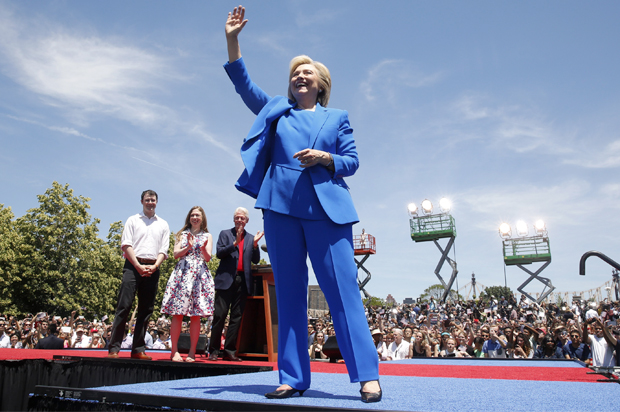This morning Hillary Clinton will deliver her first big economic policy speech of the 2016 campaign, and all indications are that she will embrace full communism. Hillary’s strong position in the polls notwithstanding, she still has to keep an eye on two Democratic rivals making plays for the restive liberal base of the party: Bernie Sanders and Martin O’Malley. Sanders has amassed an impressive share of the Democratic electorate by running hard to the left on economic issues: single-payer healthcare, expanding Social Security, breaking up big banks, etc. O’Malley doesn’t have anywhere near the support that Sanders does, but he’s cranking out white papers on topics like climate change and bank regulation that are laying down markers for the 2016 policy fight.
And so with two competitors running hard to the left, Hillary wants to grab herself a slice of that liberal enthusiasm. Her big speech “kicking off” her campaign last month laid out some of the broad economic themes she’ll run on: higher wages, reducing economic inequality, clean energy and so forth. The speech today will put a tiny bit of policy meat on those bones. Hillary’s advisers gave a preview of what she’ll propose to the New York Times:
Her most ambitious ideas, which her advisers say are designed to help families, include prekindergarten for all 4-year-olds, expanded access to child care, paid sick days and paid family leave, helping to make college students “as debt free as possible,” a higher minimum wage, company profit-sharing for employees, legal protections for people in country illegally, and more financing for medical research.
Universal prekindergarten alone could cost tens of billions of dollars over the next decade, according to outside advisers to Mrs. Clinton.
As the last sentence of that block quote indicates, Hillary’s policy platform is already being framed in terms of cost to the taxpayer – the lede of the Times article characterizes her agenda as “muscular federal policies that would require hundreds of billions of dollars in new spending and markedly expand Washington’s influence in a host of areas.” And, of course, when a Democrat proposes an expansion of federal programs to aid the poor and working class, there’s a quick assumption that the increase in spending will be controversial and a ripe target for attack by Republicans. Again, from the Times:
The question is whether the lofty vision she is articulating as a candidate for the Democratic nomination is one that can be turned into a mandate if she is elected president.
“The problem for Hillary is that the country itself isn’t hungering for liberalism,” said Jeremy Mayer, an associate professor of politics at George Mason University. “Republicans will be well positioned to say to Hillary, ‘Great, and how are you going to pay for that?’”
This is so frustrating. I don’t know if Hillary is going to use the speech to get into the funding mechanisms for all these programs, though I assume it involves some combination of raising taxes on rich people, closing various loopholes, and eliminating some deductions. But why should we automatically assume that Republicans will have the better of her when it comes to spending?
A quick perusal of the tax plans put forth by some of the GOP candidates shows that they don’t really have too much credibility to criticize the (as yet unknown) price tag of Hillary’s policy proposals. Rand Paul’s tax plan, which calls for a complete elimination of our current progressive tax structure in favor of a 14.5 percent flat tax, would cost the government a gobsmacking $15 trillion in revenue over its first decade, according to Citizens for Tax Justice. Even when you goose the numbers with a hefty dose of dynamic scoring, as the right-leaning Tax Foundation did, the Paul plan still ends up costing nearly $1 trillion over ten years. Marco Rubio’s tax plan, which combines massive tax cuts for the rich with an expansion of the child tax credit, would cost $4 trillion over the same time period, and “even if you assume that the plan results in a large amount of economic growth and thus a reflow of revenue from the large economy, the plan will still increase the debt by 8 percent in the next decade.” Rubio also wants to vastly expand the military budget at the same time that he’s starving the government of revenue.
These are common themes among most of the Republican candidates – slash tax revenues dramatically while boosting funding for the military, all the while promising to make up the gargantuan costs with unspecified cuts elsewhere in the budget. A candidate whose tax policy calls for an unpaid-for, multitrillion-dollar giveaway to America’s wealthy can’t also claim the mantle of fiscal responsibility to attack a Democrat’s proposed expansion of social programs. But just as we’re conditioned to treat wildly irresponsible Republican and conservative tax plans as the norm, we seem to reflexively grant Republicans an edge when it comes to issues of government spending. I look forward to hearing what Hillary has in mind, and I hope she does explain how she’ll pay for what she’s proposing. But let’s not presume that she’s already put herself at a political disadvantage.

